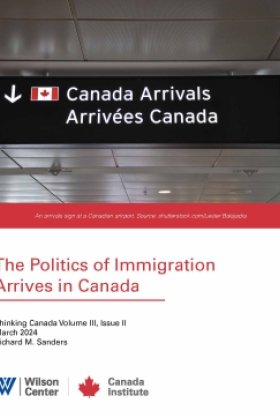<i>To Move a Mountain: Fighting the Global Economy in Appalachia</i>
Overview
Author Eve Weinbaum, Associate Professor, University of Massachusetts - Amherst; commentators Susan Tolchin, Professor of Public Policy, George Mason University, and Howard Rosen, Executive Director, Trade Adjustment Assistance Coalition.
A debate over global outsourcing is currently raging on the editorial pages of newspapers and on television talk shows. The questions at the heart of the debate are, what effect do global reorganizations have on individual workers whose jobs are relocated? What are the implications for a community whose livelihood was centered on a single factory that is moving to another continent? Those are the questions addressed in To Move a Mountain, and Eve Weinbaum shared her findings on the personal aspects of a globalizing economy at a book launch co-sponsored by the Division of United States Studies and the Project on America and the Global Economy.
Weinbaum studied the experience of three Tennessee towns, in each of which the community's collective identity was reshaped by the closure of the plant that employed a majority of the town's workers. The three towns, however, experienced the closures differently. In one case, the employees received no notice of the impending closure of their factory and discovered only after it shut its doors that their last paychecks had bounced. In another, the workers' union was able to warn them of the plant closure and negotiate minimal severance packages; ultimately, it and the mobilized workers were able to deny the factory the tax incentives that had driven its relocation to Puerto Rico. Even this leverage, however, proved to be too little and too late. In the final case, management had only recently quashed a grassroots unionization attempt before it announced the plant closure and relocated the factory to a nearby county where it could lower its wages and pay no benefits by employing solely "temporary" workers.
Weinbaum's goal in writing the book was to rebut the perception that plant closings are like the weather: they just happen. She wanted to see if anything concrete could be done on the local level to counter the effects of globalization. Noting that even the best outcome in the three communities resulted in the ultimate loss of jobs for the workers and their community, Weinbaum argued that worker action in the last two communities could be called "successful failures." The workers' consciousness was raised; they acquired organizational and leadership skills; they became politically informed and aware citizens. She reminded the audience of the amount of organization and pressure required to achieve even the minimal victory of denying corporations the expected tax breaks for relocation. What is needed, Weinbaum declared, is an end to the effort to "sell poverty" and to the "race for the bottom" that has developed between countries, states, and even counties. Until there is a national minimum for the inducements such as low wages, high tax incentives, and an anti-union environment that can be offered to corporations for moving to a given area, there will be no reason for corporate entities to treat their workers responsibly. Without support at the national level, Weinbaum concluded, grassroots attempts on behalf of economic justice for workers will not succeed in protecting individual workers and communities. As long as "job creation" in one community is touted as a success for local governments while job losses and plant closures in another community are excused as "economic choices" on the part of corporations, there is little hope for the enshrinement of fair treatment for workers.
Howard Rosen commended Weinbaum's work for putting a human face on the "dark side of globalism and capitalism" and urged her to examine ways the nascent labor movements started in the wake of these plant closures might turn into measurable increases in voter turnout, marking the beginning of a new political force. While there is nothing inherent in capitalism that is evil, he noted, there is also "nothing inherent in capitalism that suggests that its outcome will be fair and equitable"; it is corporate self-aggrandizement and absence of reinvestment in communities that creates the problems found in Weinbaum's case studies. Rosen stressed the need for policies that provide transitional assistance for workers who lose their jobs because of globalization. Such policies would lessen the impact of job loss by, for example, expanding unemployment insurance benefits and maintaining workers' health insurance.
Sue Tolchin, wondering whether the kind of protest detailed by Weinbaum will make a difference, commented that outsourcing is beginning to affect high level workers such as lawyers and accountants. That may give the issue traction with the voting public and impel national policy makers to change the support structures currently in place. She criticized the stance of some unions, warning of the injustice done to workers when the heads of their own lobbying groups grow too close to the corporate interests they are supposed to balance or, as was the case with NAFTA, permit the implications for workers to be sidetracked. Tolchin emphasized the need for federal policy in the area of interstate competition, saying that when it comes to trade policy, the country operates as it did under the Articles of Confederation, without coherent central planning.
In a thought-provoking question and answer session, Weinbaum reiterated her belief in the importance of skill-building for workers so they can recognize the warning signs of impending factory closures. Only with the ability to protect themselves, she declared, can these workers expect to have any sort of power when negotiating with their employers. Rosen, however, commented that while the idea is a good one, it is unlikely to take hold. When the economy picks up, most people will lose interest in issues of economic justice and worker empowerment until the economy hits its next slump, when workers are likely to be caught in a similar position. All three panelists agreed that this is an area in which new and creative federal policy is an absolute necessity if workers are to be protected.
Drafted by Ann Chernicoff
Philippa Strum, Director of U.S. Studies (202) 691-4129
Thank you for your interest in this event. Please send any feedback or questions to our Events staff.










